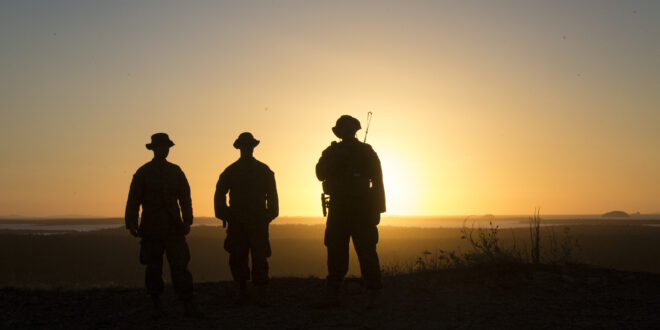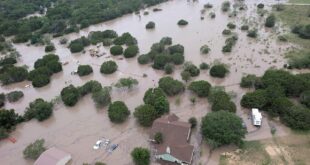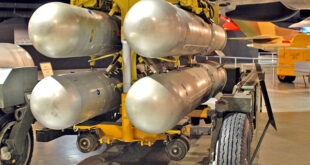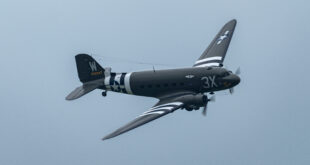Four days of a live-fire exercise left us smoked and ready for exfil. We still had to play a farewell joke.
The metal monster boomed over us and arced up and away to the south. It had disgorged its 13 passengers – a U.S. Navy SEAL team, ready to hop and pop out for a five-day, live-fire desert training operation, pitting them against a company of bad-ass U.S. Marines. As a contracted desert survival instructor for the U.S. Special Warfare Command, I was along for the contest. This exercise followed a five-day desert survival course I had conducted the previous week, getting the team ready for deployment to the Middle East. This desert area was a no-man’s land that spread out about 30 miles on either side of the Lower Colorado River, and received less than three inches of rainfall a year (the hottest and driest landscape in the U.S., similar to many areas of the Middle East). Now, having exited the metal monster via parachute, we were on our own.
The four day exercise would leave us smoked and ready for exfil after four days of little sleep, scant water, and less food. But we would end it with the energy to pull one last prank against the “enemy.”
In the unforgiving desert environment, we moved at night. That way we avoided the searing sun, the hot blowing wind, the radiating rays from the light ground surface and the ground temperatures, which can be 20–40 degrees hotter than the surrounding air temperature. We had the element of surprise, and carried night vision gear. We were hoping the “enemy” wouldn’t be that alert, nor expecting unfriendly visitors at 3 a.m.
Our heavy night-humping, water-consuming trek went on until a couple of hours before dawn. We found a seven-foot high, north-facing bank that would provide us with shade during the first heat-numbing, 12-hour hole-up. We dug down six inches into the soil where it was as much as 10–15 degrees cooler, and a bit damper. That made the 120-degree, daytime bivouac more bearable, allowing a bit of rest. Ever mindful that the enemy U.S. Marines were on the prowl, we alternated watches on the edge of the wash, keeping conversation to a whisper.
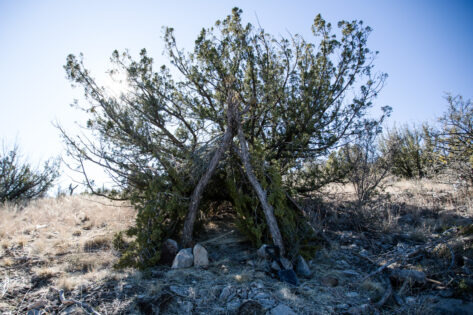
Relentless Heat Baked Everything
We watched shadows slowly move across the sand. The relentless desert day heat baked all life on the brown, black, and yellow landscape. Just sitting there, covered in desert camouflage, we soaked up enough heat to sweat all day, losing precious water by the minute. I felt like a biscuit baking in an oven.
Our only distraction was observing local wildlife and how they adapted to the desert. We watched a thin, scraggly, yellow-eyed coyote escape the heat by slinking into his cool den up on the hill across from us. He glanced down at us briefly, as if to say: “Dudes, you should crawl into a hole, like me.”
A desert jackrabbit dug down into the dirt, and burrowed in under a creosote bush. A kangaroo rat scraped out a hole along the side of another bush, kicking sand with its uncommonly huge back legs. He, too, disappeared into his cool den. We saw spiders and all manner of creepy crawlies dashing down tiny dirt holes as the sun leaned over them. Most of them were waiting until night to do their hunting, just like we were. A cave would have been the best location for us to coil up in, too, the coolest place in the desert. The only problem would be the probability that other coiled, slithering creatures had the same idea, some of them able to strike faster than the SEALs.
READ MORE: One Angry Rhino, Three Rookie Trackers, and Trouble in Africa
There was some whispering among us regarding the jackrabbit and what a nice stew he would make. But that would require water we couldn’t afford to lose, and we would have to talk our team leader, Mr. Thomas, into letting us do it. No chance.
As we had learned on the desert survival course, food is a low priority when water is in short supply. Food has weight, as well as requiring extra water to digest it. We learned that four days on minimum rations had little effect on the team’s efficiency. The SEALs were always in Iron Man physical condition, anyway.
Hunger? Sure, but the body transitions onto its reserves of fat and other nutrients to keep body efficiency up for that short amount of time. That hunger increases sight, sound, and smell sense awareness – valuable attributes when dodging or looking for bad guys.
At dusk, as if to signal it was time to go to work, the wiry desert dog came out of his den just as we were getting ready to make our move. He moved faster than we – much faster. But he didn’t have to heft heavy loads on his back and crunch along dry washes for another nine-mile hump, sweating all night and draining water canteens. He knew where the water was. We didn’t.
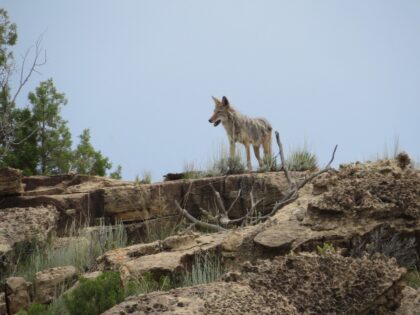
The coyote knew where the water was. We did not.
We would need to find a cache or well somewhere. Of course, both of those options would increase the chance of detection. The command had decided that the SEALs should try to accomplish the mission with what they could carry. Big Problem! Many of our water containers broke on the high-impact jump, narrowing down the chances of completing the mission without a resupply – a warning of things to come.
We picked up the sounds of Marine Jeeps as they groaned around the sand flats, searching for evidence of our night moves.Those groans led us to the location of the simulated airfield target. Around midnight, we found another good arroyo lay-up spot about a mile from the target, and burrowed into the dirt like our friend, Brer Rabbit.
Mobile “Big Eye” Unit
Our leader, Mr. Thomas, sent a pair of two-man recon teams slithering along the sand to survey the objective, avoiding the Marines’ security patrols. It would be a huge feather in the Marines’ helmets if they compromised the elite SEALs before we even hit the target. We were not going to let that happen.
Like many SEAL Team leaders, Mr. Thomas led from the front to gather his own intelligence and make first hand decisions regarding the strike. Andy and Tom made up the second recon team, approaching the target from a different direction while the rest of us stayed back in the wash, on constant alert in case either recon team was spotted. What we didn’t know was that the Marines had what was called “The Big Eye,” large night vision screens that covered a much wider area than simple goggles. That’s what compromised Tom and Andy as they crept up on the small airfield.
A mobile “Big Eye” unit caught their movement. It lit them up with spots, and started firing at them (blanks, of course). Tom and Andy immediately transitioned into the escape and evade mode, running and jumping over berms, dodging through washes, keeping low and avoiding the patrol. They headed for a pre-planned hiding spot away from our position, so as not to lead the pursuers to us.
The rules of the game said that because they were spotted, they were dead. This reduced our assault team to nine warriors, myself included.
When Mr. Thomas crawled back to us, he was furious that the two men had let themselves be seen, and let us all know this in his customary cursing and fist-pounding way. We cringed under the verbal onslaught, but the lecture was over quickly. We dropped back into the cat-napping and water sipping mode, drinking from our last canteen. Three gallons goes fast on this kind of hike.
I dozed off, and woke up to a faint buzzing sound, like a faraway chain saw. It was first light, that in-between night and day time when one is most relaxed and wanting more sleep. The buzzing got louder and flew past my face. I pried open my eyes and caught sight of two honey bees streaking back and forth along the row of dozing SEALs… Ah, yes; the bees.
The two disappeared over the arroyo bank and I fell back into that half-sleep, half-awake state. I was dreaming of pouring a gallon of ice tea down my throat and all over my body, when Big Buzzing woke me up again. This time it was much louder and stronger. I popped awake to the realization that we were being attacked by a swarm. The two earlier visitors had been recon bees, doing just what we were doing, scouting a target. After their scout, they brought back the full attack elements from their hidden hive, armed with loaded stingers.
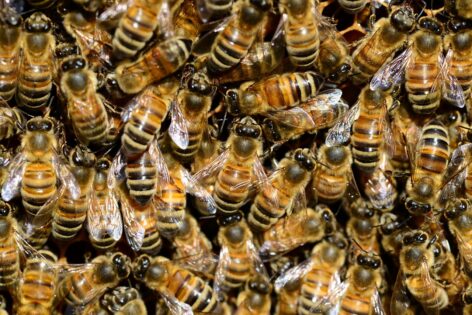
We encountered the bees.
Attack of the Bees
The rest of our team woke up with a jump, realizing we were under siege from zooming, buzzing, ferocious, yellow and black flying machines that were searching for, guess what? Water, water, water. The bees, like us, were victims of a record drought year, even less rainfall than the three-inch average. All critters and plants in this desert were desperate for water, just like we were to become, and anything that provided it was fair game.
Bees landed on us with wild abandon, on hands, face, noses, ears, neck, head, searching for anything wet. Brushing them away was fruitless and resulted in multiple stings. We grabbed our packs and pulled out head netting, throwing it over our faces, tucking it down into our shirts. It didn’t matter. The bees were all over the netting, searching for a way to get to face moisture. When we reached for our canteens, they swarmed around the canteen neck, trying to get in. We had to slip the canteens under the netting, quickly slosh down water, put the cap back on and then slam the canteen back in the pack. Some of the little bastards were waiting for that and zipped under the netting. That required us to sit perfectly still while tiny bee-feet tip-toed across sweaty bare noses, mouths and ears. It was maddening. Everyone got stung – multiple times.
The worst was when we had to pee. The bees followed the urine stream right back up into our pants. We developed a technique of peeing on the run, where we would trot down the wash, urinating and swatting bees as we ran, trying to out-maneuver them, to no avail. Our team executive officer, Mr. Lindsey, lost his cool and went running down the wash, screaming and cursing and swatting, giving the rest of us a much needed laugh and reason for good-natured verbal harassing.
Two men fell victim to venom poisoning – nausea, headaches, swelling, dizziness – one man getting 17 stings. The command called an administrative halt to the mission. They wanted to cancel the training mission. Mister Thomas informed them that “failure was not an option” and that we were going to finish this play, even with half the actors gone.
The two bee-poisoned men were evacuated, along with Tony, the team medic, who was suffering from a lingering back injury he had sustained on the parachute jump.
I envisioned headlines: “U.S. Navy SEAL Team compromised by Honey Bees.” But then I realized the SEALs and other developing U.S. military special warfare units were still classified, and the media hadn’t discovered them yet.
This left us with six men to hit the target, less than half the original team. We were also out of water now. A water cache was brought in with the evacuation vehicles. Once again, the need for adequate water planning for this type of mission became evident. Nobody can walk through the wall of dehydration. Not even Navy SEALs.
At dusk, just as suddenly as they had appeared, the bees left. We licked our wounds, literally, and made final plans for the night attack. We napped on and off until midnight, keeping scope vision on the Marines and their movements.
We wanted to be on target about 3 a.m., deep-sleep time for the Marines. We would fire up the target, escape and evade to the foothills another half mile away, and then melt into the desert mountains, where we would hole up the next day, eluding the trackers and, hopefully, the bees.
At the midnight hour, we tightened up sleeves and pant cuffs, slipped on protective gloves, buttoned our desert fatigues up to the neck, and slipped over the bank to become one with the desert – one with Wile E. Coyote, sneaking up on the elusive Roadrunner.
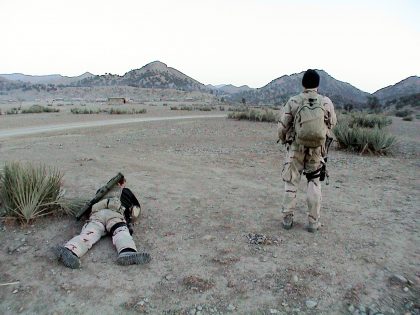
“RED, RED, RED” Attack
Thomas led our low crawl along shallow creek beds, stopping intermittently to listen and scope the target. The only sound was the rasping and scraping of desert camouflage uniforms and packs sliding against sand, rock, dirt, cactus spines, critter droppings, and dust – lots of dust. No coughing, spitting, blowing noses, and for God’s sake, no sneezing allowed on this snake-slither. When we heard search vehicles, we curled up like armadillos. Then, foot by foot, we crept along at lizard elevation, eating dirt until Mr. Thomas put up his hand.
We were there. We had made it without detection. This was a major victory, and we all silently pumped our fists. Yeah, it’s showtime, folks. Marines? What Marines?
It was time to direct our heavy metal at the simulated air base. Thomas called in the “RED, RED, RED” attack signal that we had humped all this miserable way to hear. The Marines had 30 minutes to evacuate the area and get into protected underground bunkers.
We loaded our LAWs and M-14 rifles and set up the 60mm mortar. I couldn’t wait to pull that first white phosphorous mortar round out of my pack. It would light up the enemy compound like a circus, giving us easy visual targets. Then the real home-wrecker mortar rounds would follow, arcing up, across and down, spraying deadly steel on the old, salvage aircraft, vehicle skeletons, and temporarily constructed barracks that made up the target.
Thirty minutes were up and we got the signal to begin the assault. I dropped the first round into the firing tube. I wanted 4th of July fireworks, my reward for humping the damn rounds 20-plus miles.
“Thump.” Nothing. It didn’t detonate.
I tried a second one: “Thump.”
Chris sounded off. “Damn! Must have damaged the firing pin in the mortar tube on the parachute drop. Son of a bitch.”
I thought to myself: “The Gods must be pimping us.” They had to be saying: “Let’s hurl all the lightning bolts at these SEALs. After all, isn’t their motto: ‘The Only Easy Day Was Yesterday?’ Let’s see what they really got.”
But the Gods had never reckoned with the indomitable Mr. Thomas. “OK,” he shouted. “We’ll light up the target with the 40 millimeter illumination rifle rounds.”
I braced the M-14 rifle butt on my leg and shot off the rounds, each recoil wreaking havoc with my thigh muscles. They exploded above the base in small white clusters, giving us just enough light to aim the LAWs, grenades and M-14 rounds right at the nose cones.
The sky lit up. The desert lit up. We lit up. The nose cones got scrambled. The accessory sheds got scrambled. The main, temporarily constructed shelters survived because we couldn’t drop the big mortars on them. Two out of three ain’t bad. We had done enough damage to call the mission successful.

The Roadrunner and Wile E. Coyote
When all the ammo was used up, Thomas radioed the bunkered Marines that the attack was over. But it really wasn’t. Now we had to blend into the desert night, evade the searching Marines for another day and a half, and find our way to the safety of the extraction point – escape and evasion at its finest.
The Marines would give us 30 minutes for reaction time before launching their Jeeps, trackers, and main company of foot soldiers, searching for us and our footprints. We would now become the Roadrunner. They would become Wile E. Coyote.
We grabbed our packs and ran for cover and concealment in the low hills about a mile and a half away. We figured the hills would hide us long enough for a quick break and then we would penetrate farther into the Chocolate Mountains.
We collapsed into the first line of foothills just before daybreak. Zoned out and dehydrated, we decided to snooze briefly in the soft sand, behind some boulders.
I blanked out, dreaming of iced tea, filet mignon, and pecan pie.
We nodded off with our packs still shouldered, so we could jump up and run in an instant. Pure exhaustion turned cat naps into short-term, deep recovery sleep. It was a deadly mistake. We didn’t see ‘em comin’.
Chris was on sentry duty. He saw the Marine company coming over a rise, not far from our spot. They had picked up our tracks. What Chris didn’t notice was the scout tracking patrol, barreling along ahead of the full company, full of excitement, energy, food, water, and the anticipation of hunting down the Navy SEALs. The full company of jar-heads was not far behind the trackers, loading up their grenade and M-14 blanks while the Jeeps roared across the flat desert, heading our way like Wile E. C.
By the time Chris realized they were upon us, the Marines scouts were shooting blanks, and throwing grenade simulators.
“Boom, Bang, Boom!” Explosions brought us up screaming and shouting from our deep-sleep cat naps. “What the hell, what the hell!” More booms, shouting and cursing.
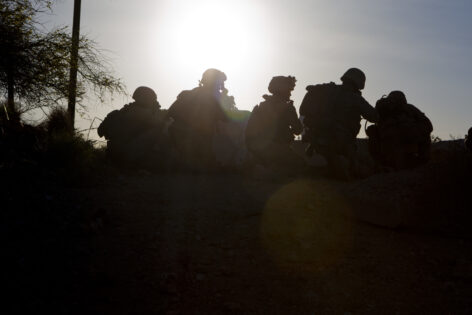
Time For a Fight
This was “fight or flight” time. We fought. We threw simulators back at them, shot blanks, and shouted obscenities. Then, as we broke contact with the Marines, I looked over my shoulder and saw the sun silhouette of Thomas shaking his fist at the enemy scouts and challenging them all to a fist fight.
The rules of the game were that if we got compromised, the Marines would dig in at that location, give us another half hour to escape, then come looking for us again. They didn’t know where the extraction point was, so they would have to track us once more.
Because the extraction point was another hard day and night’s trek away, we would have to hump hard and fast in the heat of the day to stay away from the Bad Guys.
The Marines would be using vehicles again, making sounds that traveled a long way across open desert. We would know where they were most of the time. We also knew that when the vehicles stopped, the trackers would be out on the ground, searching for boot prints. If the vehicles didn’t start up again, we knew they had found something and would be on foot patrol. Tracking us now in the low mountains would be difficult. We trekked along rock edges and over desert hardpan whenever we could, minimizing prints as we went.
Water once again became our main concern. That, and heat. We were headed into the dehydration and heat stress danger zone, with dry throats, thick spit, sluggish movements, drying eyes, headaches, nausea, short tempers, bodies heating up, and minds slowing down. We needed that water!
We had the option of calling in an administrative water supply drop, but that would give the Marines a moral victory. Mister Thomas had other ideas.
There was a buried water cache between us and the extraction point. We would have to find it and dodge the Marines at the same time. That meant waiting until nighttime. We had map coordinates for the cache site, but there were no distinguishing landmarks. It was about a mile and half away, out in the flats, where the enemy was skirting the low mountains, looking for Roadrunner tracks. It would be a risky, one-shot deal, with a high chance of being detected.
Chris and Lindsay thought they had found the right spot. But without any kind of landmark, like a dead cactus, rock pile, or arroyo, they were stymied. They frantically dug around the area and had just about given up when Chris hit a metal container with his custom K-Bar knife. It was the cache.
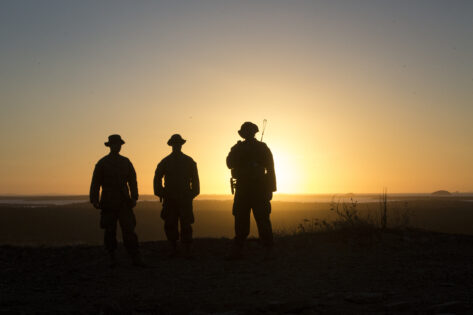
The Marines hunted us while we hunted for water.
Desert Gold
“Hooyah, I found it,” he whispered to Lindsay. “There damn well better be water in here.” He pulled open the hinged lid of the 50mm ammo can, and gave a thumbs up. The dull, starlight-reflected plastic containers were full of the most precious stuff in the desert. Chris and Lindsay humped six gallons back to our hole-up spot, and we gulped the liquid gold like it was the last water on the planet. For us it was.
Per our earlier training on the desert survival course, we drank until we thought we would puke. We filled our bellies till they sloshed. Then we waited for 20 minutes while excess liquid filled our bladders and had to be eliminated. This would be the clear urine that told us we were as hydrated as we would ever be. Then we gurgled down one more quart, using our stomachs as an extra canteen, giving us another four hours of hydration. It would be uncomfortable for another 15 minutes, but well worth it. This allowed us to speed up our extraction, even though the exertion would increase our sweat rate.
We could hear the Bad Guys, as they were following the edge of the foothills in the same direction we were going. They evidently had found some tracks. The Jeep sounds got closer, but stayed on the desert floor. They couldn’t find a reasonable vehicle route into the rugged terrain. We kept our distance. It would have been another huge feather in the Marines’ helmets if they found us again. Mister Thomas would have gone ballistic. I imagined him turning into the Incredible SEAL Hulk and smashing Jeeps to pieces with his bare hands.
The SEALs Were Here
Around midnight, vehicle noise stopped and we figured the Marines were going to hole-up until daylight. The six of us were getting into that giddy mood when extreme fatigue starts to make all the stresses humorous. We decided to one-up the Marines and pay them back for their earlier compromising rush into our bivouac. We snuck up on their encampment, using our night vision goggles to scout for lookouts. There weren’t any. After all, nobody was chasing them – they thought. But they had no idea whom they were dealing with in Mr. Thomas. Even in our strung-out condition, we were going to be audacious enough to hunt them back.
LaConte came up with the idea. He would creep up to the edge of their camp and see if they were all sleeping. If they were, he would crawl up to the closest vehicle and leave a note on it saying that the SEALs had been there. Mister Thomas loved it. He gave LaConte a go-ahead, and we watched him slink along the desert floor like a hungry rattlesnake, seeking his prey. He disappeared into the foothills. An hour later we heard scratching sounds, and saw Dave ‘The Snake’ slithering back along the desert floor, waving his fist in the air.
We smiled through cracked and dry lips. HOOYAH! This time, Wile E. Coyote – 1, Roadrunner – 0!
We spent the rest of the night humping away from the Marine encampment toward our extraction point. We reached it the next morning, laughing to ourselves and joking all the way about the sign on the Jeep that read ‘THE SEALS WERE HERE.’
From a story by J.D. “Desert Dog” Ganci
 Soldier of Fortune Magazine The Journal of Professional Adventurers
Soldier of Fortune Magazine The Journal of Professional Adventurers


